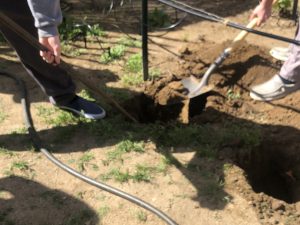In honor of Earth Day, we can all look for ways to stretch our dollars. Thrifty gardeners also reduce energy consumption and pollution, while saving water and other natural resources.
Make Every Drop Count. Water is precious and expensive. In California, the greatest use of energy is to pump, move, and distribute water. The energy involved in providing water can also be a significant source of atmospheric carbon dioxide. The less water we lavish on our gardens and lawns the better for all.
Reduce garden water by mulching generously with homemade compost, wood chips, pine needles, or stones. Use drip water and plant more natives as they tend to be drought tolerant.
The biggest outdoor water-water is typically the lawn. A traditional Kentucky bluegrass lawn slurps up an inch or more twice a week during the summer; fescue grasses require somewhat less. Consider downsizing your turf and/or switching to a different kind of grass. Buffalo grass requires only one to two inches every few weeks! Read more at www.toddvalleyfarms.com
Don’t Buy Unnecessary And Risky Chemicals. There are pesticide or fertilizer “solutions” to virtually any garden problem. However, many of these concoctions are costly, unnecessary, and potentially harmful to soil, water, and wildlife.
During breakdown, fertilizers release nitrous oxide with its great global warming potential. The manufacture of nitrogen fertilizers and chemical pesticides is also highly energy demanding and a big contributor to greenhouse gas emissions.
Compost equals free slow-release fertilizer plus weed control, drastically decreasing the need for chemical fertilizers and herbicides. Compost can reduce air pollution; fertilizer runs off into our streams and improves soil quality.
By foregoing most insecticides and inviting insects to our yards, we obtain a potpourri of free services:
- A healthy insect population helps eliminate the need for chemical insecticides. Birds and amphibians also contribute to this natural balance. For help managing insect problems, visit https://ipm.ucanr.edu/PMG/menu.homegarden.html.
- Insects are irreplaceable pollinators. Bees facilitate pollination of many billions of dollars of crops. According to Forbes, in 2019, between $235 and $577 billion (U.S.) worth of annual global food production relied on native bees, honeybees and flies. More pollinators mean better crops, lower food prices, and bigger yields from home gardens.
- Insects contribute billions more in environmental clean up services ranging from dung burial on Rangeland to breakdown of yard waste into compost.
Spend Time, Not Money. Frugal gardeners often grow plants from seeds and cuttings. Share plants with friends and they in turn will share with you. Grow an orchard or vegetable garden, even if only a tub or two on the patio.
Limit expensive, polluting fossil fuels. For example, use a people-powered lawn mower rather than a riding mower, a rake rather than a leaf blower, a spade rather than power tiller. Allow autumn leaves to remain on the soil to form nutritious and water-saving humus.
Reuse and recycle landscaping materials. Broken concrete from your old patio can be turned into rain permeable pathways and terraces; lumber from an old deck repurposed into fencing and bird houses.
Visit the U.S. Environmental Protection Agency at https://www.epa.gov/watersense/landscaping-tips for innumerable greenscaping ideas.
Vera Strader gardened frugally with drip water, liberal mulching, and by welcoming most insects into her yard.

